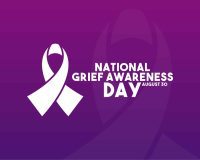There is no one way to grieve for the loss of a loved one just as there is no right or wrong way. Grieving isn’t linear and can pop up at any time and grieving for the loss of a loved one can take many different forms and different paths.
According to Katherine Schafler, New York City-based psychotherapist, writer and speaker, we tend to swallow our grief. It’s our defense mechanism for keeping at bay the enormity of emotions that come up because they’re simply too overwhelming to feel all at once and so we find ourselves in denial about what we’re feeling and how we truly feel about what that loss means to us.
Grief isn’t just related to the loss of life of someone we know. If you have been terminally diagnosed, the grief can also be for yourself—for the loss of the life you had before compared with what is coming. Feeling grief and anger over not being able to do the things you used to do is common. If your diagnosis isn’t terminal but required treatment such as chemotherapy, you may still experience very valid feelings of loss and grief over the changes your body had to endure for the treatment and some of the side effects, some of which could last for for years.

Ideally, the denial eventually fades away but even when you think you are over it and life has seemingly gone back to normal, there can still be those moments in the middle of the night or when you least expect it, that the grief comes back, and with it those paralyzing feelings. Schafler believes that some losses are so exquisitely painful. Finding yourself in the throes of grief again, you may be tempted to stay wrapped in the numbness. There are some steps you can take that will still allow you to grieve but will also allow you to live again:
- It’s important to understand that no matter how many months or years after you suffered your loss, recognize that your heart is broken. When you can see and understand the loss and its effects on you, only then can you begin the act of healing.
- Recognizing the loss brings you to recognizing that you need to grieve. The gravity of a loss can feel like a burden to you and so the grieving is necessary as a way to process and release the feelings of burden. Schafler suggests asking yourself “What do you feel was taken from you?” “What do you feel you are burdened with?” The answers to those questions help you recognize what you need to grieve.
- When you can identify your feelings surrounding your grief and loss, you may also find yourself in touch with feelings of anger, sadness, bitterness, resilience, compassion and any other feelings you encountered during your loss). This is actually a good thing and by recognizing them and being in touch with them, you will in turn move through them and so move through your grief and releasing yourself from the loop of denial.
https://www.thriveglobal.com/stories/10668-the-one-thing-no-one-ever-says-about-grieving




